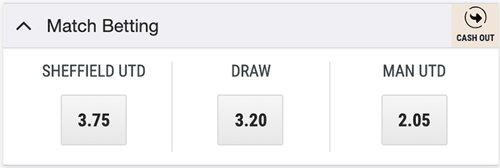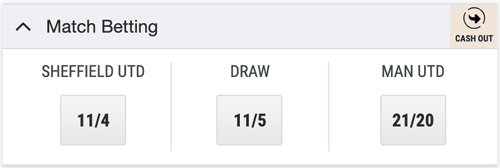Decimal odds are an important aspect of any betting strategy and it’s vital you know what they are and how they work.
In this article, we’ll check out what decimal odds are, how they work and most importantly how to use them.
Let’s get started.
What are decimal odds?
As you probably know, betting is based around odds and probabilities. There are various formats that the bookmakers use to present theses odds to punters.
The most common formats are:
- Fractional odds – UK format
- Decimal odds – European format
- Moneyline odds – American format
Whilst the fractional odds format is traditionally the most popular in the UK, the use of decimal odds is on the rise.
In this article, we’re mainly going to focus on decimal odds.
So, what are decimal odds?
Decimal odds show the price of a given market in a clear and easy to understand manner
With decimal odds, bettors can also work out their potential winnings more easily, as we’ll look at below.
This is what decimal odds look like:
6.00 or 3.00
They’re more like regular numbers when compared to other formats such as fractions or moneyline odds.
Decimal odds vs fractional odds
You’re probably wondering what the difference between decimal and fractional odds is.
Technically there’s no difference in the actual odds.
3.20 and 11/5 both mean the same thing, the difference lies in how they’re presented to punters.
Here are some decimal odds:

And the same odds in fractions:

As we’ll look at next, certain platforms like betting exchanges display their odds in decimals whereas other, more traditional bookmakers still use fractional odds.
Betting exchanges and decimal odds
Betting exchanges are becoming increasingly popular and more punters are turning towards them. They offer far more flexibility than traditional bookmakers and they’re arguably easier to use.
As I mentioned earlier, betting exchanges like Smarkets, Betfair and Betdaq all present their odds using the decimal format.

Unlike traditional bookmakers like Ladbrokes and Coral, punters can’t change the odds format at a betting exchange.
Whilst this has a number of benefits, it’s important you understand how decimal odds work if you regularly use a betting exchange.
How do decimal odds work?
The great news is that decimal odds are incredibly easy to work with, especially when compared to other formats.
So how do you calculate potential winnings using decimal odds?
You simply multiply your stake by the decimal odds. It’s as simple as that!
Here’s an example to help explain.
Let’s say that you’re placing a £20 bet on Leicester City to beat Manchester United. The decimal odds are 3.50.
To work out a winning return, simply multiply your stake by the odds.
£20 x 3.50 = £70
So in this example, your return would be £70 and your profit would be £50 (£70 – £20 stake).
As you can see, decimal odds are super easy to work with.
Let’s look at some other benefits of using decimal odds.
Benefits of decimal odds
There are many benefits of decimal odds including:
- Better for beginners
- Easier to calculate winnings
- Easier to compare odds
Let’s look at these in more detail.
Better for beginners
Decimal odds are far easier for beginners to understand compared to other formats.

When beginners see odds such as 4/7, it’s very confusing and you’re often unsure what it means. However, when you present that as decimal odds (1.571) it makes more sense.
A £10 bet will return £15.71.
All in all, if you’re just getting started with betting I recommend you choose decimal over fractional odds.
These days, even traditional bookmakers allow punters to alter the odds format.
Easier to calculate winnings
As we looked at earlier in the article, it’s far easier to calculate your potential winnings when odds are presented in decimal format.
This allows you to spot valuable markets more quickly meaning you won’t miss out on profit.
Trying to calculate your winnings with other odds formats sometimes requires a calculator, something that’s not needed with decimal odds.
Easier to compare odds
There’s no doubt that decimal odds are easier to compare than other odds formats.
This is great for certain betting strategies such as matched betting where you need to compare different markets at a glance.
Doing so with fractional odds is quite challenging even for more experienced bettors.
If I show you a comparison, you can assess which odds you think are easier to compare.
3.00 and 4.00
Or
2/1 and 3/1
Even with relatively simple odds, the first set is certainly easier. You’re just looking at two numbers and working out which are more valuable.
This is very useful when using tools like OddsMonkey’s OddsMatcher software which helps you scan for the best value odds.
It’s also much easier to work out the value of a market when the odds are presented in decimal format.
How to convert odds formats
I recommend you start by using decimal odds. However, if for some reason you’re not able to do this or you just prefer fractional odds, the process of converting odds is relatively straightforward.
If you’re looking to convert fractions into decimals, use the following process.
Simply divide the fraction and add one.
So for odds of 2/1, divide 2 by 1 and add 1.
So the decimal odds would be 3.00 in this example.
As you become more familiar with odds, you’ll be able to convert odds just by looking at them. You’ll get to know what means what.
Decimal odds and betting
Like all odds, decimal odds play a huge role in the betting industry.
The entire betting exchange industry is built around decimal odds meaning it’s essential that you know what they are and how they work.
This is especially the case for any matched bettors out there or for punters who are looking to check for the best value odds.
Depending on your betting strategy, you may use decimal odds all the time or very rarely. But no matter how much you use them, they’re still worthwhile knowing about.
